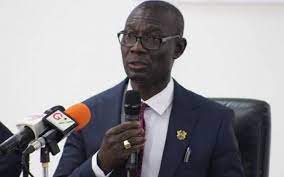The President of the ECOWAS Court, Justice Edward Amoako Asante, has challenged the UN agency responsible for refugees to work with the relevant regional and national institutions towards the adoption of legislation that will enhance the protection of stateless persons, refugees and internally displaced persons.
“We only interpret the law and its existence helps us in decision making,” he told the Director of the UN High Commission for Refugees, UNHCR, regional bureau for West and Central Africa, Ms. Millicent Mutuli at a virtual meeting on Thursday, September 23,2021.
He added that it will help those of concern to the UNHCR- stateless persons, refugees and IDP’s- to approach the Court for the protection of their human rights as the court has only received a few cases from this category of persons mainly because of the absence of appropriate legislation.
“It is so sad that despite the challenges faced by these people, we have not received many cases from them as this would have given us the opportunity to test the law,” he said.
Justice Asante praised the partnership with the agency with which the Court signed a Memorandum of Understanding in 2015 for collaboration in the protection of stateless persons, refugees and internally displaced persons through capacity building and information sharing.
He expressed the hope that the successor MOU, being worked on by a technical team of both institutions, will accommodate the outstanding activities such as the training of the judges on International Humanitarian Law and Lawyers from Member States.
Earlier, Ms. Mutuli spoke of the need for the two institutions to restore their partnership so that people of interest to the UNHCR, whose resort to the court has been ‘minimalist’ can leverage it in securing legal redress for the protection of their human rights.
She expressed the hope that the new MOU will not only accommodate the outstanding activities in the previous MOU but elaborate new areas for the partnership.
Ms. Mutuli also spoke of the need for the two institutions to strengthen their collaboration in improving the Court’s visibility for this purpose, adding that the UNHCR ‘will be happy to bring its experience working with other regional courts in Europe and the Americas into its relationship with the ECOWAS Court mainly in the area of training for the judges.’
According to her, the UNHCR is already engaged with the ECOWAS Parliament and the government of Cote d’Ivoire in the area of legislation, particularly on the issue of statelessness with Cote d’Ivoire because of the risks faced by such people due to gaps in the law.
She added that it was also engaged with the relevant authorities in the Republic of Mali and Senegal on the issues of Refugees in these countries.
The meeting was attended by the Vice President of the Court, Justice Gberi-be Ouattara, the Chief Registrar as well as the Deputy Chief Registrar and the Director of Research and Documentation.
GIK/APA


